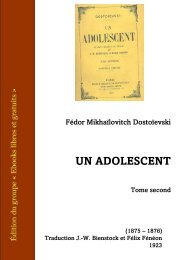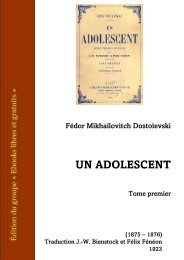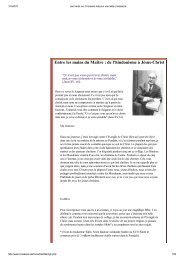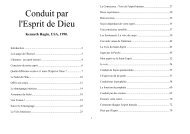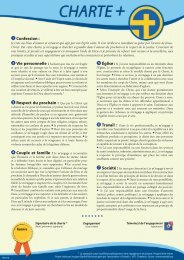341332
Create successful ePaper yourself
Turn your PDF publications into a flip-book with our unique Google optimized e-Paper software.
8 FATHERS, PASTORS AND KINGS<br />
the episodes that are described in this book have received attention from other<br />
scholars: the quarrel over Jansenism, the gallican crisis of the régale and the<br />
1682 Gallican Articles all have been the subjects of several studies which highlight<br />
their political implications for the crown, the papacy and even the lower<br />
clergy. 23 Yet none of them attempts to understand the positions that the episcopate<br />
assumed when it became a central participant in these contentions, by<br />
identifying the convictions that drove it to behave as it did. Why, for example,<br />
did the episcopate approve the famously anti-papal Gallican Articles of 1682<br />
when, in contrast, the Sorbonne refused to do so until it was forced? Most historians<br />
have simply assumed that the Articles were an expression of Louis XIV’s<br />
control over his bishops. 24 But it is possible, and more appropriate, especially<br />
in the light of what we now know about the frailties of the so-called absolutist<br />
government of the Sun King, to explain the episcopate’s action in terms that do<br />
justice to the sophisticated political and theological principles that shaped its<br />
view of papal and episcopal power. In doing so, it quickly becomes apparent<br />
that these Articles were not just a politically motivated betrayal of papal authority,<br />
but a legitimate articulation of the episcopate’s ideology of ecclesiastical<br />
hierarchy and government.<br />
Of course, the relationship between ideas and actions is complex and<br />
difficult to unravel; for this reason, scholars, who prefer to examine either one<br />
or the other, frequently ignore the symbiotic relationship linking them. Yet they<br />
then tell only half the story, for attitudes, principles and ideas play major roles<br />
in the formation of self-conscious identities and, ultimately, they regularly shape<br />
the actions and events in which identity is both manifested and perpetuated.<br />
This book, therefore, traces the dynamic interplay between ideas and events,<br />
examining the impact that conceptions of episcopacy had on key ecclesiastical<br />
events of the era, while simultaneously investigating the formative role of these<br />
incidents in the evolution of views on the episcopal office. Though what is<br />
offered here is primarily a history of ideas, it is essential to situate these within<br />
the realm of actual historical events, rather than examining them purely in the<br />
abstract. Yet in a work of this size, it is impossible to include every single episode<br />
involving the bishops in order to display the impact of episcopal ideology on<br />
events. To do so would entail writing an exhaustive history of the entire French<br />
church, since the episcopate was such a central and active body within both<br />
church and society. Just one example illustrates this: so many quarrels erupted<br />
between the episcopate and the regular clergy that it would be tedious as well as<br />
repetitive to undertake detailed narratives and analyses of all of them. Since<br />
most of these clashes hovered around identical issues of hierarchical jurisdiction<br />
and discipline, the best approach is to use representative cases from these<br />
episodes to construct a coherent overview of the ideas at work in episcopal<br />
actions; naturally these incidents include those which proved most momentous







